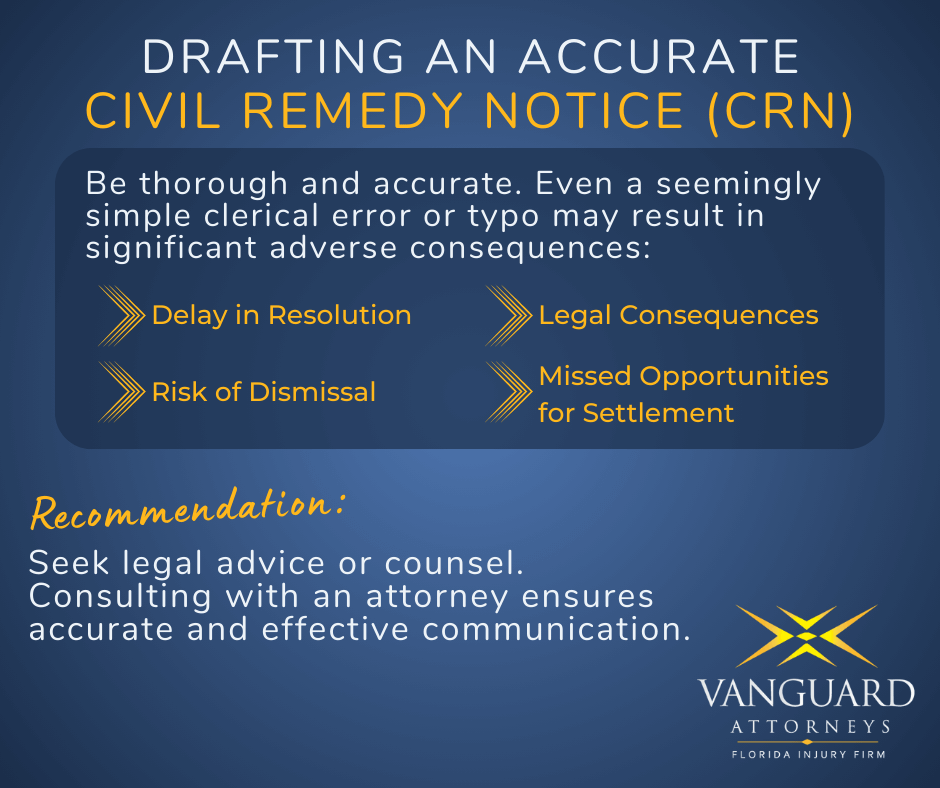What is a Civil Remedy Notice (CRN)?
Get a Free Consultation A Civil Remedy Notice (CRN) is a critical step in Florida insurance law that serves as a formal notice to an insurance company, often filed by a Florida personal injury attorney, that a policyholder intends to file a bad faith claim against them.
A Civil Remedy Notice (CRN) is a critical step in Florida insurance law that serves as a formal notice to an insurance company, often filed by a Florida personal injury attorney, that a policyholder intends to file a bad faith claim against them.
What is a CRN?
A CRN is a mandatory document filed with the Florida Department of Financial Services (FDFS).
This government agency oversees the insurance industry in accordance with the provisions of the Florida Insurance Code.
It plays a vital role in licensing insurance companies and agents, regulating insurance policies and rates, and serving consumers through education and complaint resolution
It must be submitted at least sixty (60) days prior to initiating a bad faith lawsuit against an insurer.
A consumer may want to initiate a bad faith lawsuit against an insurer if they believe the insurer has unreasonably denied their valid insurance claim or acted in a manner that violates their rights under the insurance policy.
The CRN alerts the insurer to potential legal action and provides an opportunity for resolution before escalating to court proceedings.
Why is a Civil Remedy Notice (CRN) Necessary?
Insurance Claims Evaluation:
- When you file an insurance claim (e.g., uninsured motorist claim), your insurer evaluates it.
- Unfortunately, insurers don’t always act in good faith during this process.
Bad Faith:
- Florida statutes define what constitutes “bad faith” in Chapter 624.155.
- Insurers are required to settle claims fairly, honestly, and with due regard for their insureds’ interests.
- If an insurer fails to do so, a bad faith claim may arise.
Purpose of CRN:
- Before pursuing a bad faith case against your own insurer, you must file a CRN.
- After the passage of HB 837 in 2023 consumers may consider filing a CRN against the liability insurance carrier for an at-fault third party when that carrier acts in bad faith.
- This notice gives the insurer a chance to address the issues raised.
Implications of Serving a Civil Remedy Notice (CRN)
Timeframe:
After filing a CRN, the mandatory waiting period of 60 days serves several important purposes:
Opportunity for Resolution:
- The waiting period allows the insurer time to review the CRN and address any concerns raised by the policyholder.
- It provides an opportunity for the insurer to rectify any potential bad faith actions or unfair practices.
Good Faith Effort:
- By waiting for 60 days, the policyholder demonstrates a good faith effort to resolve the dispute without immediately resorting to legal action.
- It encourages communication and negotiation between the parties.
Legal Requirement:
- Florida law mandates this waiting period under Section 624.155.
- It ensures that policyholders follow the prescribed process before pursuing a bad faith lawsuit.
Remember, during these 60 days, the insurer may choose to address the issues raised in the CRN, potentially avoiding the need for further legal proceedings.
If the insurer ignores or denies the CRN during this period, you can proceed with legal action.
Legal Action:
If, after the 60-day waiting period, the insurer remains unresponsive or fails to address the policyholder’s concerns, the policyholder has the legal right to take action.
On day sixty-one, they can initiate a bad faith lawsuit against the insurer. Such lawsuits go beyond seeking mere compensation for injuries; they also aim to hold the insurer accountable for any unfair practices, breach of duty, or wrongful denial of valid claims.
In these cases, additional damages may be sought to ensure justice and deter future misconduct by insurers.

How to Fill Out a Civil Remedy Notice (CRN)
Form Completion: The CRN form requires specific information, including but not limited to:
- Details about the insurer.
- Policy information.
- Alleged violations.
Be thorough and accurate in your descriptions. Even a seemingly clerical error or typo when filling out a CRN may result in significant adverse consequences:
- Delay in Resolution:
- Incorrectly completed forms may lead to confusion or misinterpretation by the insurer.
- The insurer might request clarification or additional information, causing delays in addressing the underlying issue.
- Risk of Dismissal:
- If critical details are missing or inaccurately provided, the CRN may be deemed invalid.
- A dismissed CRN means the waiting period won’t start, and the policyholder cannot proceed with legal action.
- Missed Opportunities for Settlement:
- An incomplete or unclear CRN may prevent the insurer from understanding the specific concerns.
- Without a well-structured CRN, the insurer may not take the necessary steps to resolve the dispute.
- Legal Consequences:
- If the CRN lacks essential information, the policyholder’s legal position may weaken.
- Inaccuracies could affect the policyholder’s ability to prove bad faith during subsequent litigation.
Recommendation: Seek legal advice or assistance when completing the CRN. Consulting with an attorney, such as those at Vanguard Injury Attorneys, ensures accurate and effective communication, maximizing the chances of a successful resolution.

Case Study: When and Why You May Need to File a Civil Remedy Notice
You, a Florida resident, find yourself in an unexpected situation after a car accident. Here’s how it unfolds:
- The Accident:
- You were driving along Dale Mabry Highway when another vehicle ran a red light at the Kennedy intersection and collided with your car.
- The impact left you with significant injuries, after being taken to the hospital via an ambulance the doctors confirm you have a broken leg and a fractured arm.
- Your beloved Jeep suffered considerable property damage and needed to be towed from the scene.
- The person who hit you is a high school graduate who apologizes profusely, but tells you they couldn’t afford car insurance anymore and let the policy lapse.
- Your Insurance Coverage:
- Fortunately, you had the foresight to purchase auto insurance, which includes uninsured motorist benefits.
- These benefits are designed to protect policyholders like you when they encounter an uninsured or underinsured driver.
- Reporting the Incident:
- You promptly contacted your insurance company, Progressive, to report the accident.
- Armed with the police report, photos of the scene, and your medical records, you provided all necessary details.
- Unexpected Response:
- To your surprise, Progressive claimed that your injuries were minor and offered you a paltry sum—just a few hundred dollars.
- Your medical bills from the required surgeries amounted to tens of thousands of dollars, and now you are stuck with massive medical bills from co-pays and out-of-pocket expenses you can’t afford.
- To make matters worse you weren’t able to work for a few weeks after the crash and used up all your savings while you were out of work.
- Taking Matters into Your Hands:
- Frustration set in. You decided it was time to take action against Progressive.
- Before diving into a full-blown legal battle, you needed to follow the proper procedure: filing a Civil Remedy Notice (CRN).
- Drafting the CRN:
- You sat down and composed a formal Civil Remedy Notice to Progressive.
- In this notice, you outlined the insurer’s violations:
- Their failure to attempt a good-faith settlement of your claim.
- Alleged deficiencies in their communication and handling of your claim, which is not uncommon.
- The Countdown:
- You patiently waited for the mandatory 60-day period following the CRN.
- During this time, you explored your legal options and consulted with an attorney.
At this point, Progressive may recognize their mistake and cure the Civil Remedy Notice (CRN) by tendering the policy limits. Or they may “double down” and claim there is a difference of opinion as to the value of your claim.
In some instances, they may not even respond to your CRN, particularly if they believe you made any mistake when submitting it.
If they do not cure the CRN you will likely need to file a lawsuit against Progressive to have any hopes of obtaining a fair outcome.
However, if your CRN is valid and you are forced to take your case to trial, the expired CRN you filed may become a critical piece of evidence in a subsequent Bad Faith trial should your verdict exceed the policy limits.
Why Consult with Vanguard Injury Attorneys?
While you can fill out a CRN yourself, consider seeking legal advice from our experienced attorneys at Vanguard Injury Attorneys:
- Expertise: We understand the intricacies of CRNs and bad faith claims.
- Maximized Recovery: Our team ensures you receive fair compensation.
- Legal Strategy: We guide you through the process to protect your rights.
- A Civil Remedy Notice (CRN) is a complicated document that requires attention to detail and specificity, any mistake or error may invalidate it leaving you back at square one. (If that happens the insurance carrier is unlikely to even tell you, allowing you to waste time and perhaps even miss a statute of limitations effectively ending your case.)
Remember, a CRN is a critical step, but discussing your situation with a lawyer can help you make informed decisions. Contact us today for personalized assistance!
